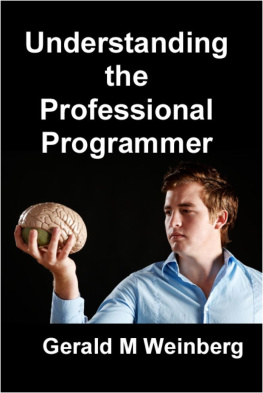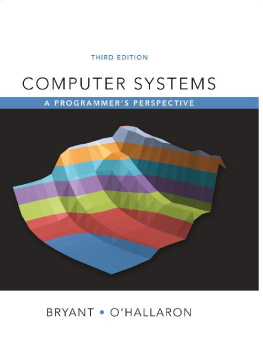Copyright 2011 by Gerald M. Weinberg
Dear Reader: Even with many layers of editing, mistakes can slip through, alas. But, together, we can eradicate the nasty nuisances. If you encounter typos or errors in this book, please send them to me at: <> Thank you! - Jerry Weinberg
All rights reserved. Without limiting the rights under copyright reserved above, no part of this publication may be reproduced, stored in or introduced into a retrieval system, or transmitted, in any form, or by any means (electronic, mechanical, photocopying, recording, or otherwise) without the prior written permission of both the copyright owner and the above publisher of this book.
Dedication
Boys and young men acquire readily the moral sentiments of their social milieu, whatever these sentiments may be. The boy who has been taught at home that it is wicked to swear, easily loses this belief when he finds that his schoolfellows whom he most admires are addicted to blasphemy. - Bertrand Russell
To Ross Ashby, Kenneth Boulding, and Anatol Rapoport who got me addicted to blasphemy.
Trademark credits: All trade and product, names are either trademarks, registered trademarks, or service marks of their respective companies, and are the property of their respective holders and should be treated as such.
Preface to the Silver Anniversary Edition
The significant problems we face cannot be solved at the same level of thinking we were at when we created them. - Albert Einstein
For as long as I can remember, I've been interested in thinking. I started writing this book about thinking in 1961, worked on it for fourteen years, and finally published it in 1975. Since that time, I've received hundreds of letters and reviews of the book. Most of them confirm that the book has helped readers improve their thinkingwhich delighted me. But, because writing the book helped me with my thinking, I wasn't surprised.
I'm not a person who saves stuff. I couldn't find all the fine reviews this book received when it first appeared all those years ago, nor can I find all those letters. So, I puzzled over how I was going to write this Preface.
Well, most thinking, even general systems thinking, can sometimes use a little luck. I took a break to download my e-mail, and as luck would have it, I got one of those flattering letters, which read, in part:
My name is Wayne Johnson, and I am a veterinarian working as a technical consultant in South China.... I discovered An Introduction to General Systems Thinking quite by accident, or serendipitously, depending upon one's point of view, about ten years ago, while looking for basic information to assist me with my growth model project. I should tell you that was one of the most influential books I have ever read. The first copy I finally had to return to the university library, and after much difficulty I was able to convince some bookseller to order me a copy of my own.
Over the years, I've never grown tired of getting letters from halfway around the world (South China) from a professional in a field I never dreamed of influencing (veterinary medicine) saying this book "was one of the most influential books I have ever read."
I had, however, grown tired of the way this book had been handled in recent years. Apparently, my original publisher's models didn't include books that stayed current and in demand for a quarter-century. As a result, a series of automatic cost-of-living price increases had stuck the book with an unreasonably high price, and the reprinting algorithms simply failed to keep the book in stockeven after more than twenty printings. Used copies were sold at a premium, and my small reserve stock dwindled, so I decided to gain control of the book and put it in the hands of a more understanding publisher, Dorset. House Publishing.
And now, a few years later, revolutionary technology has led me to produce another editionthis eBook edition. Give that this book has a world-wide audience, I felt it should be more readily obtainable world-wideand eBooks made that possible. The initial price is lower, making the book more accessible to less fortunate countries than the USA. More than that, there are no shipping charges and customs duties, which often more than doubled the price. And, perhaps even more important, it's much harder for certain countries to seize the book and prevent it from reaching its intended destination. It seems there are governments in the world that would prefer their citizens not to improve the very thinking that established those governments in the first place.
When I set out to write An Introduction to General Systems Thinking, I had already written a half-dozen books on thinkingbut all in the context of thinking about computer programming. I had been doing this long enough to realize that computer languages changed a whole lot faster than people changed, so I decided to leave the programming language business to others and to concentrate on more general principles of thinking. As a result, I first published The Psychology of Computer Programming and then this book. Now, more than a generation later, both books are still around, quietly doing their work. My work.
I suppose not many people have the experience of reading their own work more than a quarter-century later, but now that I've done it twice, I find myself reflecting on what is different after all this time:
I was definitely younger then, or so it seems now. At the time, I felt rather mature and capable. I wonder if I'd have the chutzpah to start on such ambitious works today.
I know a great deal more now, from many more experiences, but my deepest interests have not changed. I'm still utterly fascinated by the human mind and its vast rainbow of possibilities. I haven't changed my conviction that most people don't think nearly as well as they could, had they been taught some principles of thinking.
My writing style has changed, and I find that some of my ancient words sound a bit quaint. For example, since publishing these books, and prompted by some feedback from readers, I have consciously eliminated sexist language from my writing. I'm happy I did. When I read authors who say that non-sexist language is too "awkward," I think that says more about them than they may wish to reveal. In this edition, I have changed as much of this sexist language as I could detect.
My recent writing speaks more of "I" than of "we" or "it." These are, after all, my thoughts, for better or worse, and I'm writing about thinking and about thinkers. So, when these indirect forms hide the thinker behind the thought, they do a disservice to my readers, who are, after all, interested in the subject of thinking. I hope that current readers will forgive this folly of my youthand perhaps gain some practice at seeing "the man behind the curtain" of every thinking process. As a result of a great deal of intentional study, I do feel I know much more today about personal differences in thinking styledrawing on models such as those of my mentors, Virginia Satir and Anatol Rapoport; the Myers-Briggs Type Indicator (MBTI); and Neurolinguistic Programming (NLP). Such models are like delicious frosting on this general systems cake. As a result of all these years of consulting, I now know more about applying these general principles to more specific situations. I've tried to capture this knowledge in my books about software management, systems analysis, problem definition, interpersonal systems, consulting, and systems design. And now, some years later, my fiction.
I'm looking forward to seeing how well these books hold up for another generation.













